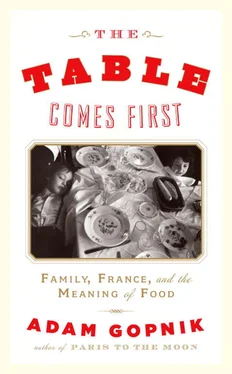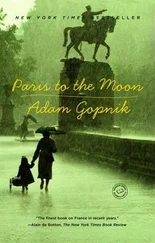Brillat-Savarin became an exile because he had been a political radical: he was a member of the revolutionary National Assembly, a Jacobin, not a lovable old duffer with a few sweet epigrams about food, but a leading voice for liberty. Yet his passion was for the politics of pleasure as Voltaire had proposed them, not the politics of purity as Robespierre and the radicals perverted them. Eating was, for Brillat-Savarin, what fighting wasn’t: mixed, mongrelized, common, and all to the good. What sped him into exile was a horror at the Utopian politics of Robespierre, the man who liked only soft and simple food, and who thought that champagne was the poison of the people’s liberty. The sansculottes came for him, and wrote a death warrant.
Brillat-Savarin fled France, penniless, in 1792, and it was then that his wanderings took him to America, where he lived and taught French and the violin to American girls in Boston and Philadelphia and New York. He played first violin in a park orchestra. (And loved the good matter, if not the then-inadequate finish, of our East Coast plenty: oysters, shad roe, and scallops.) He went back to France in 1797, with the Terror past, to work as a judge and legal theorist, but the epiphany for Brillat-Savarin as an eater occurred in 1816 when, with France as defeated as any country could be, English and German victors poured into Paris and were converted (and fleeced) by the cultural force of French food and flirtation. He realized—and this was not the last time people would see this in France; the same would follow the even more bitter defeat of the Franco-Prussian War—that the soft power of food and free love (or love for hire) could be more powerful than the steel power of armies.
To understand why gourmands could be more potent than generals became his purpose. His Physiology of Taste is not a study of an old man’s pleasures; it is a plea for the systematic study of that soft power. Brillat-Savarin’s idea that besoins —needs, wants—become demands and desires was made political through the civilizing act of the table. His program for soft power was based in what he called “social gourmandise”—what we might now call altruistic greed, or, better, unselfish gluttony. Brillat-Savarin’s ideal eater was not the gourmet—the fussbudget with a napkin—but the gourmand, the greedy guy with a date. “Gourmand,” though a word everyone knows, is a hard word to translate. Literally a glutton—but “glutton” in English has overtones of loutishness that the French word doesn’t have. To be gourmand is not just to be greedy for whatever it is they put in front of you but alive with appetite for the special thing you want. To be a gourmand is not to be a gourmet; you’re not finicky. But it is to want the good things in life. It can also be, as Brillat-Savarin recognizes, a perversity: something we have to do cut off from its proper place, and made into a fetish, a wanting. We can’t care too much about dining, but we can care too much about food. The sin isn’t loving the flesh; it’s losing our minds in loving the flesh. A moment of mindful appreciation comes between the observation and the act. Eating well is purely animal if it doesn’t become a way to think about appetite itself.
Brillat-Savarin was not just a good eater; he was, in every sense, a liberal eater. It was Brillat-Savarin who inspired the first century of food writing in French and English both. (M.F.K. Fisher’s translation of Brillat-Savarin is one of the monuments of the movement.) The tone of food writing remained most often his tone of mock-epic appreciation and semisatirical systemization, systematic but self-mocking, too. His approach—eating for pleasure and writing about what the food was like while meditating on its place in a big picture of life—is still the one that draws us closest to the real meaning of our appetites.
If Brillat-Savarin was the first philosopher of eating as a humanistic act, he was also, as Alexandre Dumas the elder remarked a little disparagingly, “a man of theory,” who hovered above and around the table and never, as Dumas scoffed, offered an actual recipe. His great rival and bookend, Grimod La Reynière, as he was known—I’ve already had to quote from him at length, as any fan or student of the period must—was a man born to pen and paper, who sat right at it.
Born in November of 1758, Grimod de La Reynière was the son of a kind of borderline aristocrat, a tax collector whose license to tax on behalf of the King was usually turned into a habit of stealing on behalf of himself. Grimod had a hideous birth defect; both of his arms were missing hands, and ended, like the lobster-boy’s in a sideshow, in strange fleshy pincers. His shame-filled parents, at a time when birth defects were still seen as signs from God, put about the bizarre story that the boy had been dropped in a pigpen, and that the swine had devoured his hands. (The effect of this lie on a boy who grew up with a special—vengeful?—love for bacon is hard to know for sure, but it’s easy to imagine morbidly.)
Grimod in any case soon had prosthetic hands and the deformity, as deformity so often does, had only a passing effect on his life: he liked to tease people by putting his wooden hands on a hot stove, leading his friends to do the same, thinking that it wasn’t. Like Brillat-Savarin, he had a bad revolution. (Though perhaps only bad people had good ones.) Starting out as a kind of libertine democrat—“I was a Republican when there was some glory in being one,” he said later, mostly truthfully—just before the revolution he had been, ironically, sent into exile by his rich and well-connected uncle, Malsherbes, as punishment for a series of sophomoric literary scandals. This meant that Grimod sat out most of the revolution in the little southern town of Béziers, where he ate well—“rabbits fed on scented herbs, quails as fat as chickens, aubergines, heaven-sent melons, muscat grapes, and Roquefort cheese fit for a non-dethroned King”—he said, with a wince of irony, and found his vocation writing about it. As word of the bloodletting spread to him—his own uncle was one of Robespierre’s prime victims—food also became a retreat from reality: “I would die of despair if I were not rescued by my good appetite,” he wrote back. Eating was then, as it is now, self-medication, a therapy of the panicked.
It was after the end of the Terror and his return to Paris that he became both a passionate reactionary—“Never did fanaticism produce a thousandth part of the evils which incredulity causes today,” he said—and the inventor of the first regular food journalist’s magazine, the Almanach des Gourmands , which first appeared in 1803. The magazine, though a bit chaotic, included blind tastings, articles on foods, and a restaurant guide. Grimod himself was a star, with his picture—overweight, sweaty looking, and a little undignified—in the first issue.
He was a greedy guy, who used his new fame to sponsor eating clubs, where the best of the new restaurants would send free food in exchange for a certificate of approval to put in their windows, and where he could invite the starlets of the day to dine with him. (Though he had a way with those wooden hands he seems, unsurprisingly, to have boasted of his skill at cunnilingus.) The idea of the French journalist as a man in search of free meals and free company and free chatte , too—which Balzac mocks, and which persists into our own day, when the Parisian food critic who pays the bill is a rare bird indeed—was already part of Grimod’s persona, and his self-invention.
What distinguishes Grimod de La Reynière from the artisanal sound of all prior food writing, even Brillat-Savarin’s, is his taste for aphorism, for summing up a sensual moment in abstract mots. The writer searches for a pregnant phrase to sum up a pleasure just past. Grimod is a first-rate epigram-maker, and still apt today. There is, for instance, his line that “the three things to avoid at the table are ‘a little wine which I bought from the grocer,’ a dinner ‘just among a few friends,’ and amateur musicians.” Or he can be neatly compact, as when he writes, “A gourmand should respect his teeth as an author his talent.” (It need be noted that it was only in the Second Empire, when a Philadelphia dentist visited France and befriended the Empress, that anything like decent dentistry came to Paris.)
Читать дальше












